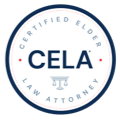
Kathie Brown Roberts P.C.
The Law Office of Kathie Brown Roberts, P.C. assists clients in Sandy, UT and throughout Salt Lake County with Elder Law, Estate Planning, Probate and Estate Administration and Guardianships and Conservatorships. The firm also regularly assists in the resolution of contested matters and estate litigation in those areas.
The firm’s managing attorney, Kathie Brown Roberts, JD, CELA and senior attorney Allison Barger, JD, CELA, are currently two of the three attorneys in the state of Utah certified as Elder Law Attorneys by the National Elder Law Foundation, the only elder law program accredited by the American Bar Association. With over thirty years of experience, Kathie is also a past Chair of the Elder Law Section of the Utah State Bar, a member of the National Academy of Elder Law Attorneys (NAELA), and the only Utah attorney member of the Special Needs Alliance. She was appointed to the Board of Directors for the National Elder Law Foundation in 2023. Kathie serves with Allison Barger on the Utah Court Committee on Probate Rules.


Kathie Brown Roberts, Esq., CELA, is the founding manager and owner of Kathie Brown Roberts, P.C. established in 2006. Kathie earned her undergraduate degree at University of Texas at Austin where she graduated in 1987. She received her Juris Doctor degree from California Western School of Law in San Diego, California in 1991, was admitted to the California Bar in 1991, the Alaska Bar in 1992 and the Utah Bar in 2005.
As a CELA, Kathie and Allison have been certified to have:
- Been licensed to practice law in at least one state and be in good standing with all Bar Associations where she is licensed to practice;
- Spent an average of at least 16 hours a week practicing elder law during the three years preceding the application for certification;
- Handled at least 60 elder law matters during those three years with a specified distribution among a wide variety of topics;
- Participated in at least 45 hours of continuing legal education in the three years preceding the application;
- Favorably been evaluated by five elder law attorney specialists who are not a member of her firm;
- Passed a full day certification examination.

Planning for incapacity is certainly an emotional challenge, but it’s simply about taking precautionary measures to ensure you and your family will be protected during a period of temporary or permanent incapacity.
If you currently provide care for a child or loved one with special needs (such as mental or physical disabilities), you must have contemplated what may happen to him or her when you are no longer able to serve as the caretaker.
For some members of our society, legal protection may be necessary even after they have entered adulthood. These individuals may have been injured in an accident, continue to suffer from an incapacitating physical illness or psychological disorder, or have some other condition that prevents them from caring for themselves.
Care Options
One of the greatest concerns for the elderly we serve and their families is that of long term care.
Care Options Learn More
What is probate? Probate is the process for handling a person’s property after their death, including transferring title.
Divorce can be complicated, frustrating,
disappointing, expensive, along with a whole range of other emotions…
"*" indicates required fields








